|
|
|
Friday, February 13th 2009 [ versión español ]
The program Science on Wheels, from the Department of Chemistry of the University of Puerto Rico at Mayagüez (UPRM), has demonstrated, since its initiation 17 years ago, that it has the winning formula for teaching science and impacting approximately 120 thousand students from both public and private schools in Puerto Rico. The program, which has the objective of motivating students to fulfill careers in Science, Mathematics, and Engineering, will travel to Spain.
Just as in Puerto Rico, Spain is also encountering the dilemma where a large number of students who have graduated from high school are not interested in pursuing careers in Science.Not withstanding, through workshops directed towards teachers and scientific demonstrations at schools, today, on the Island, this is no longer the case.
Doctor Juan Manuel García Ruiz, the director of the Crystallographic Studies Laboratory of the University of Granada’s Institute of Earth Science, began negotiations to reach a collaborative agreement between UPRM and the Consortium of the Granada Park of Sciences to implement the program Science on Wheels.Doctorate students of Applied Chemistry as well as UPRM professors traveled to the Andalucía region to introduce the educational model of Science on Wheels to this particular community.
Doctor Juan López Garriga, project director and professor in the UPRM Department of Chemistry, explained that Science on Wheels includes undergraduate and graduate students, who along with UPRM professors train teachers on new technologies so that high school students learn about sciences before they graduate and become motivated to study at UPRM.
López Garriga informed at a press conference, that the next phase of the scientific collaboration between UPRM and the new centers in Granada will be a crystallization contest between Spain and Puerto Rico that will have largely impacting results for the scientific development of the students from both countries.
He also mentioned that UPRM doctorate students offered workshops and exhibitions to teachers and students in the South of Spain. Science on Wheels demonstrated how to make science rigorous but fun at the same time.
Experts indicated that in the crystallization contest participants will develop crystals that will be judged on the basis of their symmetry, size and shape or form.
The development of crystals remains closely tied to our economy, by García Ruiz’s judgment.“When speaking of crystals we have to refer to diamonds, common table salt, sugar, bones, egg shells and quartz from clocks among other commonly used elements. That is why it’s important to develop scientific research with respect to crystals, since crystals play an important role in a large number of production processes,” he stated.
Carlos Ruiz, a doctorate student of the UPRM Applied Chemistry Program, described the experience as, “an adventure with the use of technology in the classroom.” Carlos Nieves Marrero, and Rafael Estremera also participated in the project along with Ruiz; they stayed in Spain for a period of six months.The graduate students refer to the experience as enjoyable and fun.
“We are changing models.The Institution, through graduate and undergraduate students has assumed the role of transfering the University’s technology to the schools,” said López Garriga.
Doctor Francis W. Patrón, director of the Department of Chemistry, emphasized the dedication of the College to the education of the schools.“We can’t limit ourselves to the university environment.Science on Wheels is very important for the development of scientific careers in Puerto Rico and other parts of the world,” he concluded.
This initiative is sponsored by the National Science Foundation and the Consortium of the Granada Park of Sciences.
Video
Verify that your navegator can ejecutate javascript and that has the most recent version of Adobe Flash Player. Dowmload Flash Player
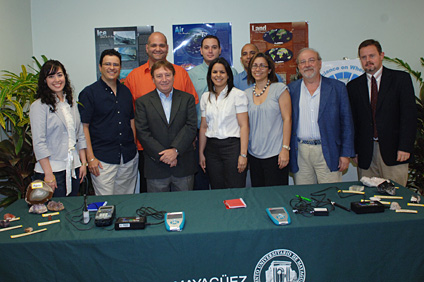
The objective of Science on Wheels is to motivate students to pursue careers in Sciences, Mathematics and Engineering.
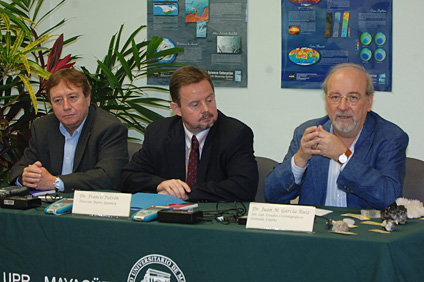
Details of the crystallographic contest were announced at a press conference.In customary order: doctors Juan López Garriga, Francis W. Patrón, and Juan M. García-Ruiz.
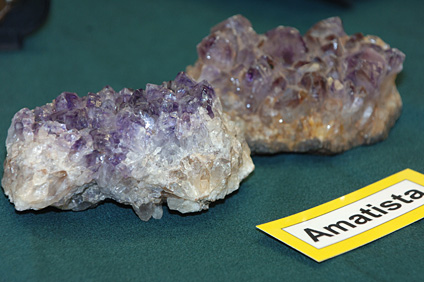
For the contest, participants will develop crystals that will be judged on their symmetry, size and shape or form.
Photographs by Carlos Díaz / UPRM Press
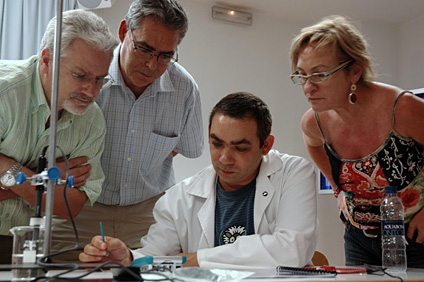
Teachers from Spain were trained on new technologies to motivate their students to study Science.
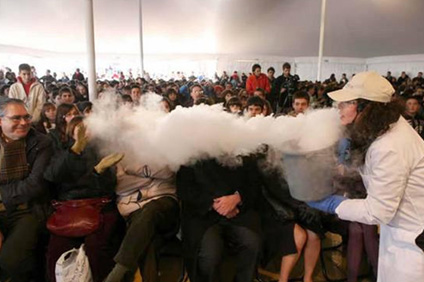
Through various exhibitions, UPRM graduate students demonstrated that science can be enjoyable and fun.
Courtesy photos
|

